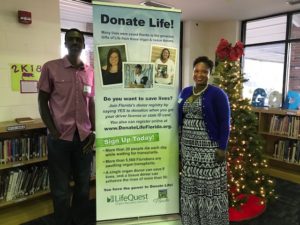High School Outreach
November 19, 2018: High schools are at the forefront of organ donor education, and engaging students is an important part of LifeQuest’s mission to give every individual the option to donate. Connecting with teenagers on their turf brings context to the overall conversation and generally has a positive effect. Classroom visits also result in a better opportunity for connection, communication and collaboration with teachers and students. What’s more, high school outreach creates an opportunity to arm teenagers with facts so that they can make well-informed decisions about whether to donate, not impulsive ones.

Dewayne Purifoy and Lillian Spell at Godby High School
The idea of organ donation can be scary and confusing to young people who may be misinformed or unaware. Myths about the process may discourage them from registering to donate the life-saving gifts of their organs. By partnering with schools, we can move beyond false public perceptions. Talking to teenagers directly builds trust and provides a chance to answer individual questions and concerns. On occasion, organ recipients and donor family members come along to share powerful stories of hope that help bridge the gap between misconception and reality.
Why talk to teenagers? By law, the Florida Department of Highway Safety and Motor Vehicles (DHSMV) is required to ask anyone applying for a learner permit or driver license if they want to join the organ and tissue donor registry. This includes 15-, 16- and 17-year-olds. The idea is to give teens the autonomy to make their own decision. Many consider it an honor to register as an organ donor on their road to independence, even if a parent or guardian still must give permission in the event of a tragedy. Signing up to be a donor can start an important conversation at home and elsewhere.
Having spent time in the classroom, it is apparent that most teenagers are unable to explain why they said yes or no to donation when obtaining a license. Many do not recall whether or not they even checked the box. Others let a parent decide for them. Clarifying how organ donation works highlights the fact that transplantation is one of the most regulated fields of health care today, and it gives students a chance to make their decision long before walking into the driver license office. It also broadens students’ perspectives and underscores the privilege of having the freedom to choose.

Libby Smith speaks at Wakulla High School.
Modern tech-savvy teenagers are busier than ever and preoccupied with what is in front of them. Given that 95 percent of people in the United States support organ donation, but only 54 percent register, it is vital that we give teenagers opportunity to pause, step back and see the bigger picture when considering organ donation. For now, the best place to do it is in the classroom.






